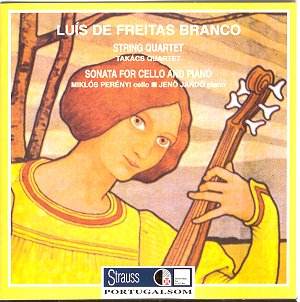Luis de FREITAS BRANCO (1890 - 1955)
Quartetto de Cordas (1911)
Sonata para Violoncello e Piano (1913)
 Takács Quartet -
Miklós Perényi, cello - Jenö Jandó, piano
Takács Quartet -
Miklós Perényi, cello - Jenö Jandó, piano
Recorded: Lisbon University, February 1979 and Hungaroton Studio, Budapest,
February 1980
 STRAUSS SP 4179 [43.31]
STRAUSS SP 4179 [43.31]

Freitas Branco, one of the founding fathers of modern Portuguese music, showed
a great inclination towards abstract music, quite unlike most older composers
of his times. Quite early on, he composed important chamber works. Indeed,
his First Violin Sonata was composed in 1907 when he was seventeen.
A few years later, he completed the impressive String Quartet (1911),
a quite substantial piece also bearing Franck's imprint, especially the cyclic
structure which remained a hallmark of Freitas Branco's music, even in his
later symphonies and in his Second Violin Sonata of 1928. However, Freitas
Branco's string quartet also has its composer moving towards Debussy and
Impressionism, though his attitude to Impressionism remains at a rather
superficial level. (Freitas Branco will soon adopt some sort of "Frenchified"
Neo-Classicism, from the First Symphony of 1924 onwards.) The Quartetto de
Cordas of 1911 is in four movements, though its structure is fairly unusual
in that the first two movements (Moderado [sic] and Vivo) are quite short,
the following Lento much longer whereas the last movement Animado [sic] is
both the longest and the most complex. Curiously enough, and this may result
from the composer's Franckian approach, the work's structure is remarkably
coherent. Freitas Branco's only string quartet is an ambitious, warmly lyrical
work that repays repeated hearings, especially in a fine performance as this
one by the celebrated Takács Quartet.
The Sonata para violoncello e piano, completed in 1913, is quite
comparable to either the string quartet of the First Violin Sonata, in that
it again strictly adheres to the cyclic constructed inherited from Franck.
From this point of view, the Cello Sonata is still more tightly argued than
either of the aforementioned pieces. But again, Freitas Branco's heartfelt
lyricism makes one completely forget any formal or structural considerations
and merely enjoy the music. This again is a warmly Romantic piece, much in
the same way as, say, Frank Bridge' Cello Sonata or York Bowen's. There is
much to relish here, particularly so in this beautifully assured and committed
reading by Miklós Perényi and Jenö Jandó.
Franck has often been mentioned in these reviews of Freitas Branco's early
music because he really was an important influence on many composers of Freitas
Branco's generation and on somewhat older ones who directly worked with Franck,
but Freitas Branco's music has its own character, what I have already referred
to as 'sunny lyricism' which is certainly one of its most endearing qualities.
These fairly early pieces reflect the enriching experience of Freitas Branco's
early maturity.
Very rewarding indeed, quite enjoyable and well-worth having.
Hubert Culot
ORDERING DETAILS
The prices remain the same but not the transport costs:
For UK --- £6 per CD
Freight --- till 3 CDs --- not registered --- £2.40; registered----
£3.50
For USA --$ 10 per CD
Freight --till 3 CDs -- not registered ---$5; registered ---- $6.80
Portusom accept Visa or American Express
Orders: for the attention of Eduarda Martins
by fax to the nº 351 21 7142353
By mail to:
Rua Adelaide Cabete,3C
1500-023 LISBOA
Portugal
by e-mail info@strauss.pt

